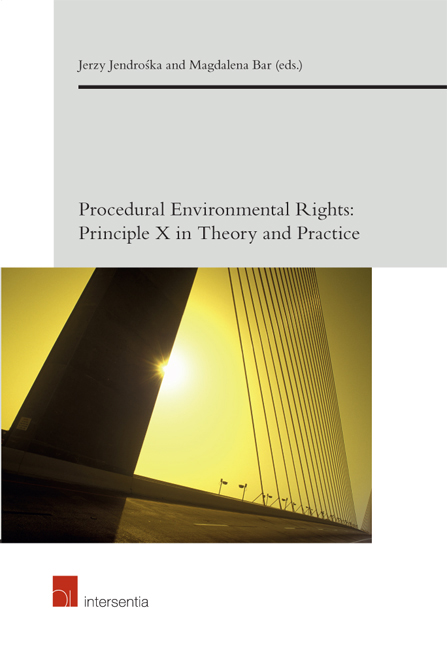Book contents
- Frontmatter
- Contents
- Introduction Procedural Environmental Rights in Theory and Practice
- Procedural Environmental Rights: Status and Developments
- Procedural Environmental Rights in Practice
- Public Participation
- Access to Justice
- Procedural Environmental Rights and Nature Protection
- Procedural Environmental Rights and EIA
- Public Participation and EIA in the Multi-Stage Decision-Making Process: The Czech example
- Use of the Bounding Conditions Envelope Concept in the Polish System of Environmental Impact Assessments
- Special Provisions on the Issuance of Environmental Decisions in Sectoral Legislation in Poland
- Procedural Environmental Rights and Climate Change
Special Provisions on the Issuance of Environmental Decisions in Sectoral Legislation in Poland
from Procedural Environmental Rights and EIA
Published online by Cambridge University Press: 12 October 2018
- Frontmatter
- Contents
- Introduction Procedural Environmental Rights in Theory and Practice
- Procedural Environmental Rights: Status and Developments
- Procedural Environmental Rights in Practice
- Public Participation
- Access to Justice
- Procedural Environmental Rights and Nature Protection
- Procedural Environmental Rights and EIA
- Public Participation and EIA in the Multi-Stage Decision-Making Process: The Czech example
- Use of the Bounding Conditions Envelope Concept in the Polish System of Environmental Impact Assessments
- Special Provisions on the Issuance of Environmental Decisions in Sectoral Legislation in Poland
- Procedural Environmental Rights and Climate Change
Summary
INTRODUCTION
There are two important features of the Polish system of issuance of development consent for projects requiring the Environmental Impact Assessment that need mentioning for the purpose of this article: the first one is the multi-stage nature of the development consent in Poland and the other is that the first stage thereof is the “environmental decision”, summarizing the findings of the Environmental Impact Assessment. The latter is regulated by the Act of 3 October 2008 on the access to environmental information, public participation and the Environmental Impact Assessment (OJ 2016 item 353 text codified as amended, further referred to as EIA Act).
At the same time, the Polish legal system provides for several sectoral Acts that derogate the general rules of the issuance of environmental decisions and replace them with separate provisions that are more favourable for the investors and at the same time lowering the safeguards for the environment. Those changes encompass the elements as mentioned:
– restrictions imposed on the proceedings of the issuance of the environmental decisions,
– automatic assignment of the immediate enforceability to the environmental decisions,
– stricter rules of challenging the environmental decisions,
– prohibition of the quashing of the administrative decisions issued at the last stage of the development process.
The following reservation has to be made: while it is true that the environmental decisions are in many cases preceded by the Environmental Impact Assessment, it is not a prerequisite for their issuance; even if a project in the course of so-called screening procedure (see Article 4 of Directive 2011/92/EU of the European Parliament and of the Council of 13 December 2011 on the assessment of the effects of certain public and private projects on the environment as amended, OJ L 26, 28 January 2012) was found to be of non-EIA nature, the environmental decision is still required. However, for the sake of the clarity of this dissertation, it is focused solely on the environmental decisions issued for the projects requiring the Environmental Impact Assessment.
- Type
- Chapter
- Information
- Procedural Environmental RightsPrinciple X in Theory and Practice, pp. 425 - 434Publisher: IntersentiaPrint publication year: 2018

